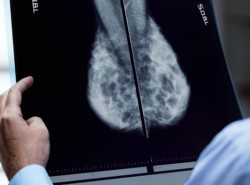
Identifying women at risk of developing breast cancer using a new blood test
Published: 05/9/21 8:22 AM

Paul James
Project Description: Identifying people at high risk of developing breast cancer can help improve prevention and early detection. This study, led by Professor Paul James from the Peter MacCallum Cancer Centre, will investigate whether a new genetic blood test can be a novel way to identify healthy women at risk of developing breast cancer.
Why This Work is Needed: Genetic, environmental, and lifestyle factors can affect an individual’s risk of developing breast cancer. This new blood test has the potential to be used in healthy women, to accurately identify their future breast cancer risk and improve personalised risk management.
Expected Outcomes: The study will provide conclusive information on whether this new blood test can be used for breast cancer risk prediction in the general population. If so, it would improve the ability of clinician’s ability to inform prevention management and detect breast cancer early, leading to improved outcomes for patients.
Project Details
As we age, the cells in our body accumulate genetic errors (mutations) that can lead to the development of breast and other cancers. Because inherited risk factors, lifestyle and environmental exposures vary, the rate that each person accumulates these mutations is different, and each person’s risk of developing breast cancer also varies.
Using new technology, genetic mutations can be detected in DNA extracted from a blood sample. Previous studies investigating cancer-associated DNA changes in blood samples have used blood collected after breast cancer diagnosis and chemotherapy, which can affect the reliability of genetic testing. For example, chemotherapy can induce genetic errors, meaning that testing for these errors after treatment does not indicate which were present prior to the breast cancer diagnosis. This means that it is unclear if this blood-based approach can be used to identify people at risk of breast cancer – those who have accumulated more genetic errors.
To overcome this, Prof James and his team will test blood samples taken from women before their breast cancer diagnosis. The team has already begun analysis on samples collected in the large “Lifepool” study, where over 17000 blood samples have been collected from women that were breast cancer-free. A subset of these women subsequently developed breast cancer. Initial analysis suggests that the number of mutations present in DNA extracted from these blood samples can identify women who are at risk of, but have not yet developed, breast cancer.
The team will now analyse blood DNA mutations from almost 500 women in the Lifepool study to conclusively determine if specific mutations and their frequency detected in blood can predict breast cancer risk. This cohort will include women with breast cancer (where their blood was collected before diagnosis) and cancer-free age-matched women. Overall, this study will provide conclusive information on whether this blood-based approach can be used to identify healthy women at risk of breast cancer, to help inform prevention management and improve early breast cancer detection.